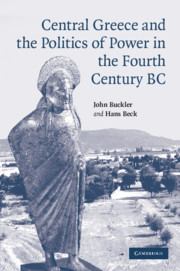Epilogue
Published online by Cambridge University Press: 22 September 2009
Summary
Until recently scholars, as noted earlier in these pages, looked upon fourth-century Greece as a period of decay and decadence, a time when the greatness of the polis had seen its zenith only to witness its decline. More recent work has appreciated it rather as a time of political evolution and experimentation that both changed the face of Greek life and left an enduring legacy to future generations. By the end of the fourth century the polis had indeed begun to lose its singular significance as the essential political institution of interstate affairs. Yet it must also be observed that during this trying period the Greek city-state staunchly confronted the challenges before it in various original and productive ways. Some of the most virulent of these potentially lethal challenges came from the combination of internal discord – stasis – and external rivalry for maximizing power and resources among states. Looming class distinctions, disagreements over the political philosophies of democracy and oligarchy, and the threat of tyranny often led to the internal disruption of the polis and to its exposure to outside force. All too often these pressures threatened the autonomy of the polis and its very way of life. These dangers led to constant social and political turmoil throughout the century and later periods, which did not end under the Roman Empire.
To ensure the survival of the polis in a larger and turbulent political world the Greeks turned to a variety of alternatives.
- Type
- Chapter
- Information
- Publisher: Cambridge University PressPrint publication year: 2008

